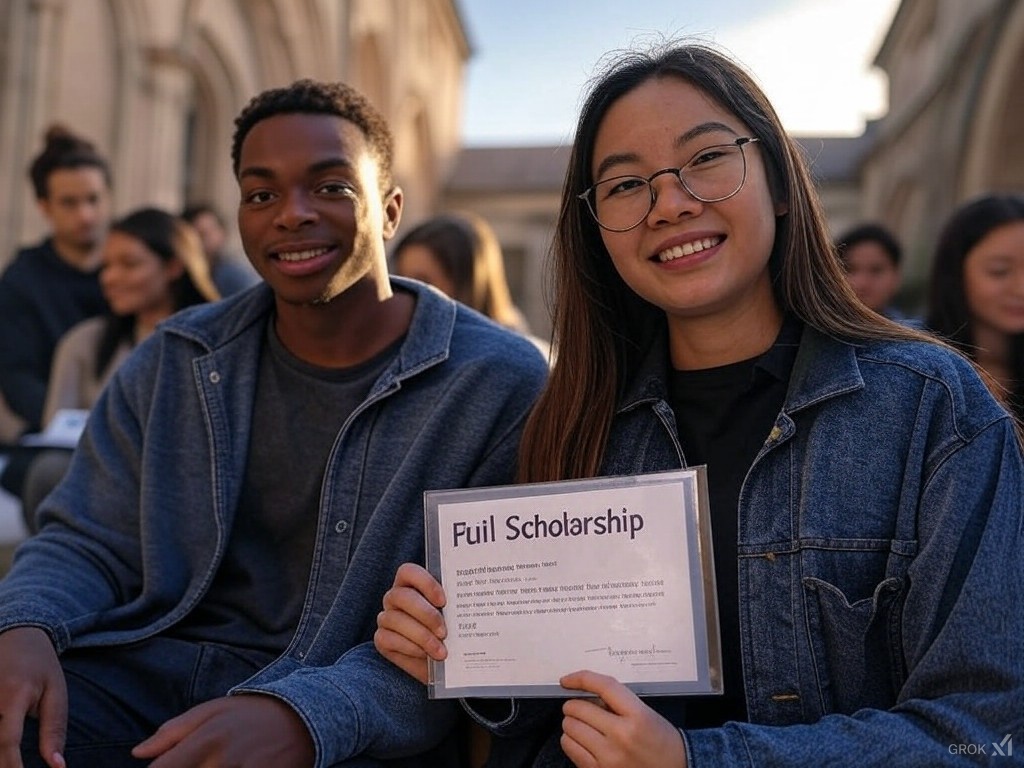Imagine studying at a prestigious European university, exploring vibrant cultures, and building a global network – all without the financial burden of hefty tuition fees. This dream can become a reality with fully funded scholarships. If you’re an international student eager to pursue higher education in Europe, this comprehensive guide is your key to unlocking incredible opportunities.
Many international students aspire to pursue higher education in Europe. The cost, though, may be a significant barrier. Talented students can realise their goals without worrying about living expenditures, tuition fees, or other charges thanks to fully funded scholarships, which act as a lifeline. In this comprehensive guide, we explore the top fully funded scholarships available in Europe, ensuring that your journey to academic excellence is well-informed and financially secure.
What Exactly is a Fully Funded Scholarship?
A fully funded scholarship is more than just financial aid; it’s a complete package designed to cover all (or nearly all) of your educational expenses. Unlike partially funded scholarships that might only cover tuition, a fully funded scholarship typically includes:
- Tuition Fees: Complete coverage of your academic program’s costs.
- Living Expenses: Stipends or allowances to cover accommodation, food, and daily expenses.
- Travel Costs: Airfare to and from your home country, and sometimes even travel within Europe.
- Health Insurance: Coverage for medical expenses during your studies.
- Other Expenses: Some scholarships may also cover visa fees, books, research materials, and conference attendance.
Who is Eligible? Eligibility Criteria and Requirements
While eligibility criteria vary depending on the specific scholarship program, some common requirements include:
- Academic Excellence: A strong academic record, typically demonstrated by high GPA scores, excellent transcripts, and sometimes even standardized test scores (like GRE or GMAT for postgraduate studies).
- Language Proficiency: Proof of English or another European language proficiency, usually through tests like IELTS, TOEFL, or equivalent.
- Nationality and Residency: Some scholarships are specifically targeted at students from certain countries or regions.
- Motivation and Personal Qualities: Demonstrated through compelling personal statements, letters of recommendation, and sometimes interviews.
- Financial need: Evidence of limited financial resources (applicable for some scholarships).
- Field of Study: Certain scholarships may be limited to specific academic disciplines.
- Age limits: Certain programs may have age restrictions.
- Specific nationality or residency: Some scholarships target students from certain countries.
Application Process: A Step-by-Step Guide
Securing a fully funded scholarship requires careful planning and execution. Here’s a breakdown of the application process:
- Thorough Research: Start early and explore various scholarship databases, university websites, and government portals. Use specific keywords like “fully funded PhD scholarships in Europe for developing countries,” “Erasmus Mundus scholarships for international students,” or “Chevening Scholarships for [your nationality]” to narrow down your search.
- Gather Required Documents: Prepare your academic transcripts, language proficiency scores, letters of recommendation (from professors or employers), a well-crafted personal statement (highlighting your achievements, motivations, and future goals), and a detailed CV or resume.
- Craft a Compelling Personal Statement: This is your chance to shine. Show your passion for your chosen field, explain why you deserve the scholarship, and articulate how your studies will contribute to your future career and your home country.
- Meet Deadlines: Pay close attention to application deadlines and submit your application well in advance. Late applications are rarely considered.
- Follow Up (If Necessary): If you haven’t heard back within a reasonable timeframe, it’s acceptable to politely follow up with the scholarship provider.
Top Fully Funded Scholarship Programs in Europe
Europe offers a wealth of fully funded scholarship opportunities. Here are a few prominent examples:
Germany
- DAAD Scholarships: The German Academic Exchange Service offers scholarships for various programs, including master’s and PhDs. Benefits include tuition, a monthly stipend, and travel allowances.
- Deutschlandstipendium: This program provides financial support to highly talented students at German universities, regardless of their nationality.
Netherlands
- Holland Scholarship: For international students outside the European Economic Area, this program provides financial support for bachelor’s and master’s programs.
- Erasmus Mundus: A prestigious program offering joint master’s degrees across European universities. Benefits include full tuition, monthly stipends, and travel expenses.
United Kingdom
- Chevening Scholarships: Funded by the UK government, this program supports one-year master’s degrees. It covers tuition, a monthly living stipend, and airfare.
- Rhodes Scholarships: One of the oldest and most prestigious scholarships globally, it funds graduate studies at the University of Oxford.
Sweden
- Swedish Institute Scholarships: This program supports master’s students from specific countries, covering tuition fees, living costs, and travel grants.
- Erasmus Mundus: This deserves special mention due to its global popularity. It offers unique opportunities to study in multiple European countries, providing a multicultural academic experience. The program covers tuition, living expenses, and travel, making it a favorite among international students. While not strictly scholarships, Erasmus+ Master Loans offer favorable loan terms to students pursuing master’s degrees in participating European countries.
For each program, visit the official websites to find detailed eligibility criteria and application deadlines.
Where to Find More Scholarships and Resources
Beyond the well-known programs, numerous other scholarships are available. Here are some resources to expand your search:
- Scholarship Portals: Websites like Scholarship Portal, FindAMasters, and MastersPortal offer comprehensive databases of scholarships.
- University Websites: Check the international student pages of universities you are interested in.
Government Websites: Many European governments offer scholarships to international students. - EU Funding Websites: Explore the European Commission’s website for information on EU-funded scholarship programs.
Cost of Living and Student Visa Information
It is very important to know how much it costs to live in the place you want to study. Costs are very different in different places and countries. To make a reasonable budget, look into how much rent, food, and transportation usually cost.
The cost of living varies across Europe. For instance:
- Germany: €850/month
- Netherlands: €1,000/month
- UK: €1,200/month (outside London)
- Sweden: €950/month
Most fully funded scholarships include a stipend to cover these costs.
The student visa application process also varies depending on your nationality and the country you plan to study in. Start the visa application process well in advance, as it can take several weeks or even months.
The student visa process generally involves:
- Acceptance into a recognized institution.
- Proof of financial stability (covered by the scholarship).
- Health insurance documentation.
- Submission of visa application through the respective embassy or consulate.
Conclusion
Fully funded scholarships are a great way to school in Europe and follow your academic dreams without having to worry about the financial burden involved. You can greatly improve your chances of getting funding by doing thorough study, writing a strong application, and meeting all deadlines. Don’t wait to start your search; stay motivated and enjoy the exciting trip that lies ahead. Get ready for your trip through Europe!
Frequently Asked Questions (FAQ)
- Can I apply for multiple scholarships at the same time?
Yes, it is generally acceptable to apply for multiple scholarships. However, be transparent with scholarship providers if you receive multiple offers.
- What happens if I don’t get a scholarship?
Explore alternative funding options, such as student loans or part-time work opportunities.
- Are there scholarships specifically for PhD students?
Yes, many scholarships are specifically designed for PhD students. Look for programs offered by research institutions, universities, and government agencies.
- What are the best scholarships for students from other countries?
Many countries have bilateral agreements with European nations offering specific scholarships. Check with your home country’s education ministry or embassy for more information.



